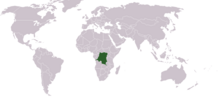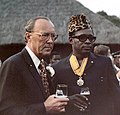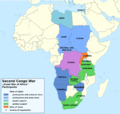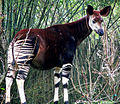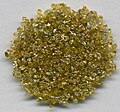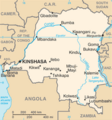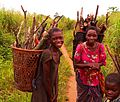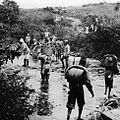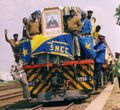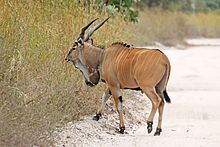Portal:Democratic Republic of the Congo
The Democratic Republic of the Congo Portal
The Democratic Republic of the Congo, also known as Congo-Kinshasa, Congo-Zaire, Congo DR, DR Congo, DRC, or simply either Congo or the Congo, is a country in Central Africa. By land area, the DRC is the second-largest country in Africa and the 11th-largest in the world. With a population of around 105 million, the Democratic Republic of the Congo is the most populous Francophone country in the world, and the fourth-largest in Africa. The national capital and largest city is Kinshasa, which is also the economic center. The country is bordered by the Republic of the Congo, Central African Republic, South Sudan, Uganda, Rwanda, Burundi, Tanzania (across Lake Tanganyika), Zambia, Angola, the Cabinda exclave of Angola, and the South Atlantic Ocean. Centered on the Congo Basin, the territory of the DRC was first inhabited by Central African foragers around 90,000 years ago and was reached by the Bantu expansion about 3,000 years ago. In the west, the Kingdom of Kongo ruled around the mouth of the Congo River from the 14th to 19th centuries. In the northeast, center, and east, the kingdoms of Azande, Luba, and Lunda ruled from the 16th and 17th centuries to the 19th century. King Leopold II of Belgium formally acquired rights to the Congo territory from the colonial nations of Europe in 1885 and declared the land his private property, naming it the Congo Free State. From 1885 to 1908, his colonial military forced the local population to produce rubber and committed widespread atrocities. In 1908, Leopold ceded the territory, which thus became a Belgian colony. Congo achieved independence from Belgium on 30 June 1960 and was immediately confronted by a series of secessionist movements, the assassination of Prime Minister Patrice Lumumba, and the seizure of power by Mobutu Sese Seko in a 1965 coup d'état. Mobutu renamed the country Zaire in 1971 and imposed a harsh personalist dictatorship until his overthrow in 1997 by the First Congo War. The country then had its name changed back and was confronted by the Second Congo War from 1998 to 2003, which resulted in the deaths of 5.4 million people. The war ended under President Joseph Kabila, who governed the country from 2001 to 2019, under whom human rights in the country remained poor and included frequent abuses such as forced disappearances, torture, arbitrary imprisonment and restrictions on civil liberties. Following the 2018 general election, in the country's first peaceful transition of power since independence, Kabila was succeeded as president by Félix Tshisekedi, who has served as president since. Since 2015, the Eastern DR Congo has been the site of an ongoing military conflict in Kivu. The Democratic Republic of the Congo is extremely rich in natural resources but has suffered from political instability, a lack of infrastructure, corruption, and centuries of both commercial and colonial extraction and exploitation, followed by more than 60 years of independence, with little widespread development. Besides the capital Kinshasa, the two next largest cities, Lubumbashi and Mbuji-Mayi, are both mining communities. The DRC's largest export is raw minerals, with China accepting over 50% of its exports in 2019. In 2021, DR Congo's level of human development was ranked 179th out of 191 countries by the Human Development Index and is classed as a least developed country by the UN. , following two decades of various civil wars and continued internal conflicts, around 600,000 Congolese refugees were still living in neighbouring countries. Two million children risk starvation, and the fighting has displaced 4.5 million people. The country is a member of the United Nations, Non-Aligned Movement, African Union, COMESA, Southern African Development Community, Organisation Internationale de la Francophonie, and Economic Community of Central African States. (Full article...) Selected article -Antoine Christophe Agbepa Mumba (born 13 July 1956), known professionally as Koffi Olomidé, is a Congolese singer-songwriter, dancer, producer, and founder of Quartier Latin International. Often referred to as the "King of Ndombolo", he is noted for his explosive high notes, deep baritone, and offbeat voice. Agbepa is considered one of the most significant figures in 20th-century Congolese and African popular music. His lyrics often explore themes of love, politics, technology, success, infidelity, religion, chicanery, and disillusionment. Through his music and stage performances, he introduced the slower style of soukous known as Tcha Tcho and popularized a flamboyant fashion subculture called La Sape, alongside Papa Wemba. Emerging as a ghostwriter for various artists in the Zairean music industry, he gained prominence in 1977 with the song "Princesse ya Synza, which featured Papa Wemba and King Kester Emeneya. In 1986, he established the group Quartier Latin International, which accompanied him onstage and on his albums since 1992, serving as a launching pad for emerging artists, including Fally Ipupa, Jipson Butukondolo, Deo Brondo, Montana Kamenga, Bouro Mpela, Ferré Gola, Marie-Paul Kambulu, Eldorado Claude, Djuna Fa Makengele, Soleil Wanga, Laudy Demingongo Plus-Plus, Éric Tutsi, among others. His career experienced a resurgence in 1990, when he signed a record deal with SonoDisc. (Full article...)General images -The following are images from various Democratic Republic of the Congo-related articles on Wikipedia.
This is a Good article, an article that meets a core set of high editorial standards.
Antoine-Roger Bolamba, later Bolamba Lokolé J'ongungu (27 July 1913 – 9 July 2002), was a Congolese journalist, writer, and politician. He edited the monthly journal La Voix du Congolais from 1945 until 1959. He also served as Secretary of State for Information and Cultural Affairs of the Republic of the Congo (now the Democratic Republic of the Congo) in 1960 and then as Minister of Information and Tourism from 1963 until 1964. Bolamba was born to a Mongo family in 1913 in the Belgian Congo. During his education he took interest in French literature and soon thereafter began to write, publishing various works and contributing to Congolese periodicals. He gained public attention in 1939 after winning awards for his writing. In 1944 he was hired by the colonial government to manage its press division, and the following year he was made editor-in-chief of a new publication, La Voix du Congolais. Bolamba held much influence in the city of Léopoldville and frequently discussed the social implications of colonialism. He also began writing poetry, and in 1956 he released a collection entitled Esanzo: Chants pour mon pays, which articulated his Mongo and Congolese identity. (Full article...)
This is a Featured article, which represents some of the best content on English Wikipedia..
The giant eland (Taurotragus derbianus), also known as the Lord Derby's eland and greater eland, is an open-forest and savanna antelope. A species of the family Bovidae and genus Taurotragus, it was described in 1847 by John Edward Gray. The giant eland is the largest species of antelope, with a body length ranging from 220–290 cm (87–114 in). There are two subspecies: T. d. derbianus and T. d. gigas. The giant eland is a herbivore, eating grasses, foliage and branches. They usually form small herds consisting of 15–25 members, both males and females. Giant elands are not territorial, and have large home ranges. They are naturally alert and wary, which makes them difficult to approach and observe. They can run at up to 70 km/h (43 mph) and use this speed as a defence against predators. Mating occurs throughout the year but peaks in the wet season. They mostly inhabit broad-leafed savannas, woodlands and glades. (Full article...)
WikiProjectsTopicsCategoriesRelated portalsAssociated WikimediaThe following Wikimedia Foundation sister projects provide more on this subject:
Discover Wikipedia using portals | ||||||||



